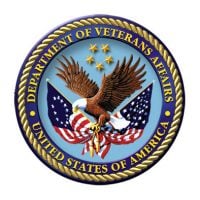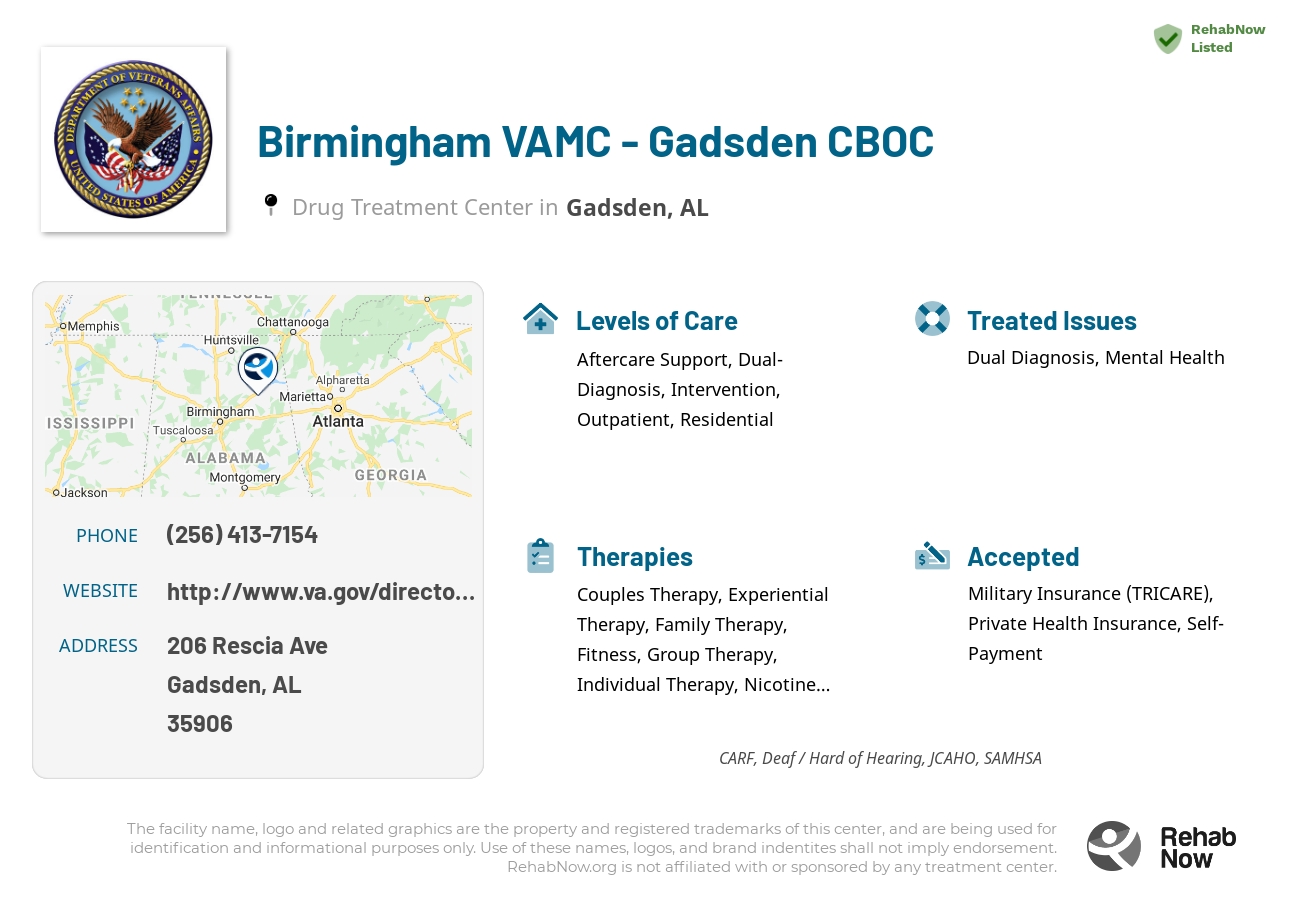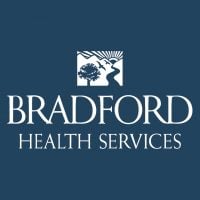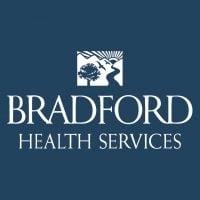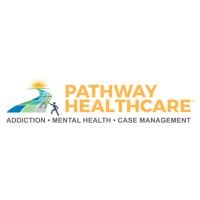About Birmingham VAMC - Gadsden CBOC in Alabama
Birmingham VAMC - Gadsden CBOC is a satellite facility of the Birmingham Department of Veteran Affairs. Located in Gadsden, Alabama, the center provides a variety of services to veterans seeking help with addiction, mental health, and substance abuse. The facility offers a full range of supportive services in order to maximize care for all veterans. They also provide outreach services, education, and awareness programs to improve veterans' quality of life.
Birmingham VAMC - Gadsden CBOC offers treatment and rehabilitation services to veterans suffering from addiction and substance abuse. These services include assessment, intervention, and relapse prevention. The center also provides individual and group counseling, medication-assisted therapies, and supportive services such as housing assistance, job placement and other community-based activities. In addition, the facility offers specialized services for women veterans, such as support groups and access to gender-specific care.
The Birmingham VAMC - Gadsden CBOC is accredited by the Joint Commission for the Accreditation of Healthcare Organizations, is licensed by the Alabama State Board of Alcohol and Drug Abuse, and is a member of the National Association of State Alcohol and Drug Abuse Directors. The facility also holds an overall star rating of 4 out of 5 stars from the VA's official Quality & Safety Program. Furthermore, the Birmingham VAMC - Gadsden CBOC has been awarded the Samaritan Award, which recognizes centers that demonstrate excellence in providing care to veterans with substance use issues.
Genders
Ages
Modality
Additional
Accreditations
SAMHSA

JCAHO

CARF
The Commission on Accreditation of Rehabilitation Facilities (CARF) is a non-profit organization that specifically accredits rehab organizations. Founded in 1966, CARF's, mission is to help service providers like rehab facilities maintain high standards of care.
Conditions and Issues Treated
Dual Diagnosis is a specific relationship between two or more disorders that have the same symptoms and can sometimes be treated together. This is used in the treatment planning process when dealing with drug addicts. Dual diagnosis can be viewed as a chronic medical condition that has comorbid psychiatric disorders.
Although addiction and a mental illness may have separate symptoms that are not easy to detect, they often go hand in hand. Many times, drug abuse is a direct result of the mental illness. In other words, treating the addiction will not resolve all of your issues. Unless you also treat the underlying mental illness, you will not be successful in achieving sobriety.
Levels of Care Offered
This center offers a variety of custom treatment tailored to individual recovery. Currently available are Aftercare Support, Dual-Diagnosis, Intervention, Outpatient, Residential, with additional therapies available as listed below.
An outpatient treatment program is set up to help with alcohol or drug addiction, or a co-occurring disorder. The patient must attend the Alabama facility for their therapy and other programs but are able to return home each night. The frequency of mandatory attendance decreases after much of Birmingham VAMC - Gadsden CBOC‘s program is complete.
Residential treatment programs are those that offer housing and meals in addition to substance abuse treatment. Rehab facilities that offer residential treatment allow patients to focus solely on recovery, in an environment totally separate from their lives. Some rehab centers specialize in short-term residential treatment (a few days to a week or two), while others solely provide treatment on a long-term basis (several weeks to months). Some offer both, and tailor treatment to the patient’s individual requirements.
Intervention services can be beneficial for people who have not been able to overcome drug and alcohol addiction on their own. It is recommended for individuals whose addiction has led to dangerous or life-threatening circumstances.
Intervention services are beneficial for:
- People who have relapsed after completing other forms of addiction treatment.
- People with drug addictions that have led to dangerous health conditions, such as HIV.
- People who are at risk of losing their family, home, or job due to addiction.
- People who are having difficulty overcoming drug and alcohol addiction on their own.
- An intervention can be conducted by professionals, or by loved ones of an addict. If the person being intervened on agrees to enter addiction treatment after the intervention, the next step would be to choose a treatment program.
If they do not agree to enter addiction treatment after the intervention, loved ones may choose to go back to the drawing board and try another form of treatment. They may also choose to not receive any further treatment, but there are usually other factors in play that may make it difficult for people to stop using drugs or alcohol.
Aftercare is a term that’s used to refer to any sort of continuing care offered for a drug addict who has voluntarily entered a rehabilitation program. This type of care can be provided in several settings, including outpatient therapy sessions after the addict has completed an inpatient program. There are also 12-step support groups, such as Alcoholics Anonymous, which can provide additional help for addicts trying to stay sober.
Therapies & Programs
Individual Therapy is a critical component of addiction recovery. Therapists work with patients to identify the root of their addiction and figure out how to better handle the issues that led to them using drugs. Individual Therapy is the one-on-one session where people meet with their therapist. Individual therapy provides a safe space for people to open up and discuss personal and sensitive topics which they may not feel comfortable discussing in a group setting.
Couples therapy at Birmingham VAMC - Gadsden CBOC focuses on addiction treatment for the addict and their spouse. The addict’s family, not just the addict, can benefit from this form of therapy. Couples therapy addresses communication problems, trust issues, lack of intimacy, and abuse in intimate relationships. Couples therapy can help rebuild trust between partners, which increases the chances for successful treatment and sustained recovery.
Intimate relationships can be damaged during addiction, and professional help may be necessary to rebuild the often destroyed trust and love. Couples therapy at Birmingham VAMC - Gadsden CBOC helps couples improve communication and rebuild trust. Either or both partners will be helped by this treatment administered by professionals. This treatment can also help one or both partners if addiction is the problem.
Family therapy will also help families realize that the addiction is not their fault. For many years, people blamed themselves for an addict’s behavior and felt that they had done something wrong. This is not the case. Addiction is a disease, and it can strike anyone, even if their life seems fine from the outside. It can bring a lot of shame to a family when they have an addict in their midst, but if everyone is open and honest with each other, then they can help everyone stay in recovery.
Group Therapy is utilized by drug treatment centers like Birmingham VAMC - Gadsden CBOC to provide the recovering drug addict with a platform to talk about their feelings and experiences. It also provides for an opportunity to learn from other addicts who have successfully overcome their addiction.
Group Therapy is employed in lectures, seminars, or discussion groups (the latter two are typically conducted as “therapy groups”). It is recommended that all group members be recovering addicts for this type of therapy to work (though it does not exclude others with lived experience).
Trauma therapy is a clinical process that helps individuals deal with mental stress often caused by traumatic events. It is generally done for children, teenage victims of sexual assault, and war veterans. The therapist helps the person identify, understand and work through the problem. This is done with the help of talking about it in group or one-on-one counseling sessions. Therapists use relaxation, role-playing, art, and music to help the person open up about what is bothering them.
Cognitive behavioral therapy is also a popular service for individuals living with addiction. This type of supportive treatment uses both one-on-one counseling and group sessions to teach addicts how to identify thoughts, behaviors and emotions that might increase their risk of relapse.
These professionals can help addicts develop coping skills for managing stress, improving self-esteem and overcoming triggers. They might also use behavioral therapy to help addicts learn how to avoid cravings and warning signs that could lead them back into addiction.
Therapy can be used as a step-down from inpatient treatment or as the primary method of overcoming an addiction. No matter which option is best for the addict, they will teach important emotional coping techniques, which can make it easier for addicts to get through the tough days.
Nutrition therapy has been used to help drug addicts for decades. Many early reports on addiction treatment indicate that some patients recovered from the “satisfying power of food”. For years, this phenomenon has been utilized as a treatment modality in eating disorders for adults, adolescents, and children. Specific nutrients have been identified that influence neurotransmitters associated with reward pathways of the brain.
Studies have shown that carbohydrate loading with complex carbohydrates to elevate serotonin levels was effective in treating bulimia nervosa. This approach prompted researchers to explore the use of this type of nutritional intervention in other disorders.
Nicotine replacement therapy treats nicotine addiction using external sources of nicotine, such as patches or gum to substitute for nicotine. This allows people trying to quit smoking to get their desired dose of nicotine without actually having to smoke cigarettes. The idea behind NRT is that by providing smokers with nicotine in forms that are not cigarettes, they may be more likely to quit smoking.
NRT has been available for many years now, and there is a wealth of evidence that shows that it helps people trying to quit smoking. There are several different types of NRT devices on the market now. Patients interested in quitting smoking should talk to their doctors about the best kind of NRT for them.
Patient Experience
Experiential Therapy at Birmingham VAMC - Gadsden CBOC
Experiential therapy is another form of treatment that helps addicts overcome their addiction. This type of service typically involves hands-on activities with the focus on physical experiences instead of emotions or beliefs.
Some examples include art therapy, equine therapy and music therapy. Each of these forms of experiential therapy can provide unique ways for addicts to channel their feelings and work through their demons. This type of therapy also allows addicts to develop meaningful emotional connections with others, which can prevent them from resorting to relapse as a coping mechanism.
Fitness Therapy
Fitness therapy is an alternative treatment for drug addiction. Fitness therapists work with addiction counselors to help drug addicts recover from their addictions by incorporating physical fitness into their treatment. Fitness therapy uses both group exercise and individual physical activity to help addicts stay fit while getting sober.
Exercise releases endorphins in the brain, which are “feel-good” chemicals that reduce pain and increase feelings of happiness. Fitness therapy aims to help addicts stay sober by associating exercise with those good feelings. By helping addicts become active, fitness therapy also helps them gain self-esteem and lose weight.
Payment Options Accepted
For specific insurance or payment methods please contact us.
Is your insurance accepted?
Ask an expert, call (888) 674-0062
Birmingham VAMC Associated Centers
Discover treatment facilities under the same provider.
- Birmingham VAMC - Guntersville CBOC in Guntersville, AL
- Birmingham VAMC - Bessemer CBOC in Bessemer, AL
- Birmingham VAMC - Shoals Area CBOC in Sheffield, AL
- Birmingham VAMC - Anniston Oxford CBOC in Oxford, AL
- Birmingham VAMC - Huntsville Clinic in Huntsville, AL
Learn More About Birmingham VAMC Centers
Additional Details
Specifics, location, and helpful extra information.
Gadsden, Alabama 35906 Phone Number(256) 413-7154 Meta DetailsUpdated November 25, 2023
Staff Verified
Birmingham VAMC - Gadsden CBOC Patient Reviews
There are no reviews yet. Be the first one to write one.
Gadsden, Alabama Addiction Information
Opioids, such as heroin, fentanyl, and prescription opioids are related to more than half of all drug-related overdoses in Alabama. Alcohol is the most frequently used substance in Alabama; 85,000 Alabamians use cocaine every single year. In Alabama, there are four times as many vehicle crashes involving alcohol as there are normal vehicle crashes.
The drug addiction problem in Gadsden, Alabama, is relatively bad. About, 988 drug overdose deaths in the city in 2016. This equates to a rate of 10.8 deaths per 100,000 population. In Gadsden, Alabama, specifically, drug use has increased dramatically over the past decade. Drug treatment in Gadsden, AL, can be customized and largely depend on a person's unique needs.
Treatment in Nearby Cities
- Rogersville, AL (93.5 mi.)
- Valhermoso Springs, AL (52.7 mi.)
- Eufaula, AL (152.3 mi.)
- Sylvania, AL (43.4 mi.)
- Butler, AL (181.3 mi.)
Centers near Birmingham VAMC - Gadsden CBOC
The facility name, logo and brand are the property and registered trademarks of Birmingham VAMC - Gadsden CBOC, and are being used for identification and informational purposes only. Use of these names, logos and brands shall not imply endorsement. RehabNow.org is not affiliated with or sponsored by Birmingham VAMC - Gadsden CBOC.
